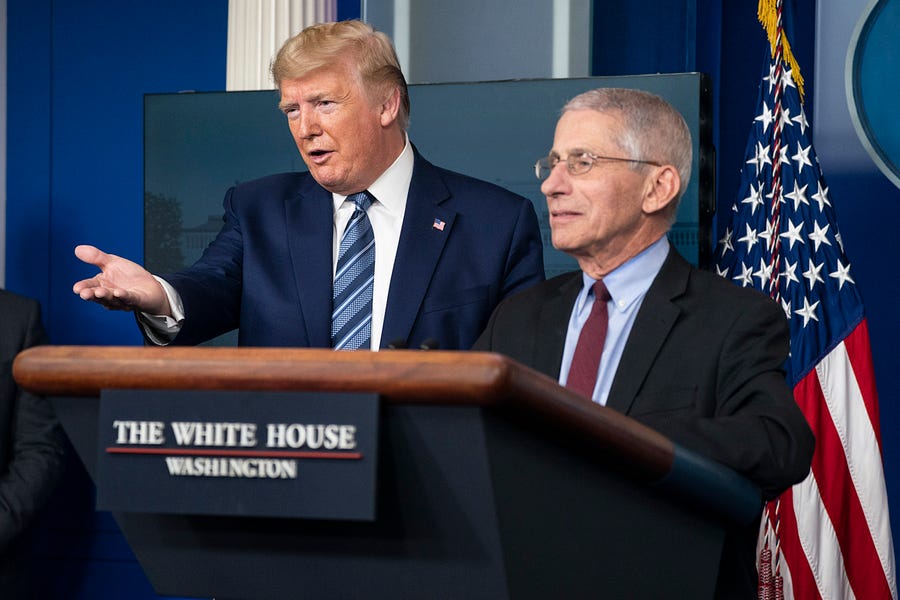During an interview with Maria Bartiromo on Fox News Business on Thursday, President Trump claimed: “when I closed the border to China, [Dr. Anthony Fauci] disagreed with that and then ultimately he agreed and said I saved hundreds of thousands of lives.” The president went on to repeat the claim, saying that due to his decision to restrict travel with China he was “criticized by everybody, including Dr. Fauci.”
The president’s comments contradict what both he and Fauci, the director of the National Institute of Allergy and Infectious Diseases, have said in the past. During the April 13 coronavirus task force press briefing, Trump was asked if he and Fauci were “on the same page.” He responded: “Yeah, we have been from the beginning.” At the same press briefing, Fauci discussed how responsive Trump was to the recommendations made by the task force. After discussing the recommendations they made regarding mitigation, Fauci mentioned: “The travel [restriction] was another recommendation, when we went in and said, ‘We probably should be doing that.’ And the answer was ‘yes.’ And then another time was, ‘We should do it with Europe,’ and the answer was ‘yes.’ And the next time, ‘We should do it with the U.K.,’ and the answer was ‘yes.’”
While Fauci said in the earlier stages of the pandemic that a China travel ban was “not something that I think we’re even considering,” according to New York Times interviews with White House aides and Fauci himself, by January 30 the leading public health officials in the federal government were recommending travel restrictions with China to President Trump. Aides also told the Wall Street Journal that it was Fauci, CDC Director Dr. Robert Redfield, and Health and Human Services Secretary Alex Azar that convinced the initially- skeptical Trump to make the decision. Azar’s explanation of the decision echoes this reporting, as he said the travel restrictions were implemented based on “the uniform recommendations of the career public health officials here at HHS.”
Fauci supported the travel restrictions with China publicly as well. At the task force press briefing on the day the restrictions were announced, Fauci said that “because there are so many unknowns here, we’re going to take the action that the secretary will describe [restricting travel from China], in a temporary way, to make sure we mitigate, as best as we possibly can, this risk.”
On February 3, the day after the restrictions took effect, Fauci appeared on CNBC and stated: “As the entry into the United States of potentially infected people is diminished because of the travel restrictions on both sides, of getting out of China and getting into the United States, I think you are going to see a dampening down of [coronavirus cases in the United States]. And that’s the reason why this was done: to protect Americans from travel-related cases.”
On February 7, Fauci told reporters that the positives of travel restrictions with China outweigh the negatives and that “this decision was not made lightly.”
During the February 29 coronavirus task force press briefing, Fauci repeated how valuable he saw the travel restrictions: “We prevented travel from China to the United States. If we had not done that, we would have had many, many more cases right here that we would have to be dealing with.” (The restrictions didn’t actually prevent all travel from China; they merely restricted it.)
On March 15, Fauci said, “The president’s decision to essentially have a major blocking of travel from China, that already had an effect of not seeding the way, in Europe—Italy didn’t do that.” The next week, on March 22, Fauci said the United States was “not necessarily at all” on the same trajectory for coronavirus cases as Italy, citing Italy’s decision not to “shut out as well the input of infections that originated in China” early on as a possible reason the country was hit particularly hard.
Fauci has consistently agreed with the travel decision. Indeed, a wide variety of reporting and his public statements make clear he was an early advocate for such restrictions in internal government coronavirus discussions. Based on all available information, Trump was not accurate to say that Fauci criticized the president’s decision to restrict travel with China.
If you have a claim you would like to see us fact check, please send us an email at factcheck@thedispatch.com. If you would like to suggest a correction to this piece or any other Dispatch article, please email corrections@thedispatch.com.
Photograph of a coronavirus task force briefing by Sarah Silbiger/Getty Images.








Please note that we at The Dispatch hold ourselves, our work, and our commenters to a higher standard than other places on the internet. We welcome comments that foster genuine debate or discussion—including comments critical of us or our work—but responses that include ad hominem attacks on fellow Dispatch members or are intended to stoke fear and anger may be moderated.
You are currently using a limited time guest pass and do not have access to commenting. Consider subscribing to join the conversation.
With your membership, you only have the ability to comment on The Morning Dispatch articles. Consider upgrading to join the conversation everywhere.